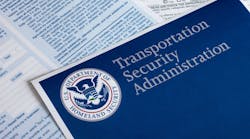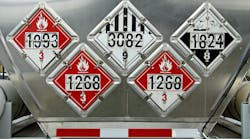The American Trucking Associations expressed its disappointment that the Federal Motor Carrier Safety Administration (FMCSA) continued its efforts to delay appropriate action on the important issue of crash accountability in its CSA program.
“Numerous times over the past five years, ATA has respectfully requested FMCSA to screen out crashes from CSA where it is plainly evident the professional truck driver and motor carrier were not at fault,” said ATA Executive Vice-President Dave Osiecki. “Instances where a truck is rear ended by a drunk driver, or hit head on by a motorist traveling in the wrong direction on the interstate, or as happened just (recently) when a truck was struck by a collapsing bridge are clearly not the fault of the professional driver and certainly should not be used to target his or her carrier for potentially intrusive government oversight.”
FMCSA uses overall crash history as one of several data points in its Compliance, Safety, Accountability safety monitoring system. ATA has repeatedly (http://www.trucking.org/article.aspx?uid=613c62f7-9f87-498d-9875-ec82c2b7a2db) called (http://www.trucking.org/article.aspx?uid=55206031-369b-4094-9e8e-b98c17f8465d) for improvements to CSA, particularly in the area of crash accountability, where the agency contends that just being involved in a crash is an indicator a carrier may not be safe.
“It is not lost on the trucking industry that the word ‘Accountability’ is in the title of CSA, yet FMCSA continues to ignore crash accountability,” Osiecki said.
ATA Chairman Duane Long, chairman of Longistics, Raleigh NC, added: “We want to be fairly judged and not be penalized by crashes our professional drivers could not reasonably avoid. It’s not only a fairness issue; it’s a good government oversight approach. We continue to trust FMCSA might eventually arrive at this conclusion.”
ATA’s comments came as FMCSA announced through the Federal Register a study that examined (1) whether Police Accident Reports provide sufficient, consistent, and reliable information to support crash weighting determinations, (2) whether a crash weighting determination process would offer an even stronger predictor of carrier crash risk than the current assessment method, and (3) how the agency might reasonably manage and support a process for making crash weighting determinations, including the acceptance of public input.
The announcement invites public comment along with a request for feedback on what steps the agency should take regarding the weighting of crash data in the agency’s systems based on the carrier’s role in a crash. Presently, the agency considers all recordable crashes involving a commercial motor vehicle occurring in the preceding 24 months as an assessment within its Safety Measurement System, which quantifies the on-the-road safety performance of motor carriers to prioritize enforcement resources.
FMCSA justified that approach on the basis of independent research has demonstrated that a motor carrier’s involvement in a crash, regardless of their role in the crash, is a strong indicator of their future crash risk. The study examined Police Accident Reports obtained from two national dataset: the National Highway Traffic Safety Administration (NHTSA) Fatality Analysis Reporting System (FARS) and the National Motor Vehicle Crash Causation Survey (NMVCCS).
Various statistical and analytical approaches were employed to assess crash weighting benefits including an analysis of motor carriers involved in single-vehicle fatal crashes over time. Changing the crash weights based on a motor carrier’s role in the crash did not appear to improve the ability to predict future crash rates when all crashes are considered, according to FMCSA.
There also was concern about the reliability of using Police Accident Reports to make this determination. The study pointed out that implementing a crash weighting effort on a national scale would require a method for uniformly acquiring final Police Accident Reports, a process and system for uniform analysis, and a method for receiving and analyzing public input.
It is estimated that the annual costs for operating a system to process Police Accident Reports, including the acceptance of public input and reviewing appeals, would be between $3.9 million and $11.2 million. The public is invited to review the full report and provide feedback. Contact: Duane DeBruyne: (202) 366-9999. ♦








